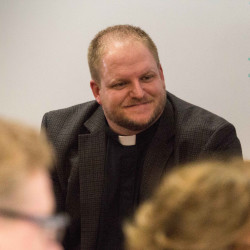By Canon Dan Alger, Canon for Church Planting
Tomorrow begins our celebration of the season of Lent. Lent is the season of preparation for Holy Week and Easter. Before we can truly experience the joy of the atoning work of Christ on the cross and his victory in the resurrection, we must understand what it is that caused the need for his sacrifice. Lent is an ancient tradition of the church in which we intentionally engage in the recognition of sin in our lives and the preparation of our souls through discipline, study, prayer, repentance and pious action.
The word “Lent” comes from an Old English word that means “lengthen” referencing this time of year when the days grow longer. Lent originally began as a 40 hour period of observance spent in fasting to remember the suffering of Christ on the cross and his 40 hours in the tomb. By the 4th century, Lent had been extended to the 40 days (not counting Sundays) leading up to Easter. 40 days is a significant Biblical number with regard to preparation (Noah was in the ark 40 days, as the earth was cleansed, Moses spent 40 days on Mt. Sinai receiving the Law of God, Elijah walked 40 days to Mt. Sinai and most significantly Jesus spent 40 days in the wilderness before his public ministry). So, we follow this precedent in our preparation for the great Feast of the Resurrection on Easter.
Lent begins with Ash Wednesday. This is a day for fasting and repentance marking the penitential focus of the season. At the service on this day, we are marked by ashes on our foreheads with the words “Remember that you are dust and to dust you shall return.” Blessed ashes have been used ceremonially in the worship of God dating back to the times of Moses (see Numbers 19:17ff) and are seen through the Bible as a sign of mourning, grief and repentance. The imposition of ashes on Ash Wednesday reminds us of our mortality and are a physical sign of our spiritual act of repentance. Many people throughout the world fast this day until after they receive the ashes.
In most Anglican churches, Sunday services will change as well to reflect the season’s emphasis on reflection and repentance. We often move the Confession of Sin to the beginning of the service with a short recitation of the Law and the acknowledgement of our guilt in breaking it. We also abstain from using the word “alleluia” for the weeks of Lent. This discipline is meant to create in us a longing to praise; a frustration at being held back in the expression of our adoration. On Easter Sunday the first words of the service are “Alleluia! He is risen!” and we can finally let forth our unrestricted praise at this proclamation of the Gospel. Our preparation makes Easter that much more powerful.
Another long-standing tradition of the Lenten season is what some call the “Lenten Discipline” or “Lenten Obligation” in which the person fasts from a particular food or activity during Lent. If you are going to participate in this aspect of season, there are a few points to remember. First of all, remember that the goal of this discipline is not to turn further inward and focus on ourselves, but in the sacrifice of something that is usually a blessing to us we are focusing on the primacy of God as first priority in our lives. Choose something that is actually going to be a sacrifice. Choose something difficult. Perhaps it is a food: Coffee if you are dependent upon it, ketchup if you use it on everything, alcohol if that is an enjoyment for you, etc. It could also be something that changes your rhythm and routine like not listening to the radio during your commute to allow time for prayer or not watching TV for 40 days. I am personally giving up all sugar this Lent — nothing with added sugar, no artificial sweeteners, no deserts or flavorings in my coffee. I’m not looking forward to it. When we give these things up it is meant to serve as a reminder to pray, to repent from our idols, to turn our thoughts towards Christ. I encourage you to pray to determine if this discipline is one that you should pursue this year.
Lent culminates in the events of Holy Week- Palm Sunday, Maundy Thursday, Good Friday, Holy Saturday and Easter Sunday. This is the most important week of the year for Christians throughout the world. In our church, we will be sharing in a Seder Dinner on Maundy Thursday, participating in a combined service with another local church on on Good Friday, and worshipping again on Easter Day.
I challenge you to engage this year in truly observing the season of Lent with sincerity. Practice community devotions, come to the special services of this season, pursue the disciplines of study, prayer and fasting. I encourage you to pray that the Holy Spirit will guide you in discovering the presence of sin in your life and move in you for your healing and transformation. Let’s go deeper in our devotion than simply attending church services and shallow prayers, but let our faith turn to disciplined action leading up to Easter.
One final thought as you get ready for Lent: this is not a season of doom and gloom, it is a season of repentance in order to know a greater joy of healing in the truth of the Gospel. Lent is a season for spiritual renewal and transformation by getting serious about sin and equally serious about the glorious truth of grace in the cross of Christ. No amount of discipline or devotion can earn the affection of Christ, that has been given to us fully and completely through his death and resurrection. Repentance, the pursuit of righteousness and a longing for Christ are our responses to the incomparable love he has already lavished on us. I pray that the Gospel will become all the more real to you this Lent as we walk in the steps of Jesus to the cross and rejoice in his glorious resurrection on Easter.
About Canon Dan
 In his role as Canon of Church Planting for ADOTS, Dan is leading our efforts to create a strong movement of church planting within our Diocese that multiplies healthy churches and healthy planters. He is also planting Anglican Church of the Redeemer in north Gwinnett County, Georgia.
In his role as Canon of Church Planting for ADOTS, Dan is leading our efforts to create a strong movement of church planting within our Diocese that multiplies healthy churches and healthy planters. He is also planting Anglican Church of the Redeemer in north Gwinnett County, Georgia.
Dan is a graduate of The University of North Carolina at Chapel Hill (BA Communication Studies) and Trinity School for Ministry (MAR Biblical Studies). Before moving to Georgia in the fall of 2012 to help plant Church of the Redeemer in Hamilton Mill/Dacula, Dan started a church in Fayetteville, NC in the military community surrounding Fort Bragg where he was Pastor for 10 years. Alongside his work at Redeemer, he also currently serves as the Director of Communications and Equipping for Anglican 1000, an initiative of the ACNA focused on church planting throughout North America. He has helped church planters and church plants as a friend, trainer and coach for many years.
